Skilled jobs needed to close North/South divide
- Published

The Sheffield City Region is being significantly outperformed by economies in the south, a report has concluded
An increase in manufacturing jobs in the Sheffield City Region could help close the economic gap between northern and southern regions, a report says.
The Sheffield Political Economy Research Institute says boosting the number of skilled jobs would stop the north falling further behind the south.
Author Tom Hunt said manufacturing was a "good base to build on".
The government said the research, commissioned by BBC Sheffield, backed the case for its Northern Powerhouse.
The findings come from a review of the economies of Sheffield, Brighton and surrounding areas, and Oxfordshire.
Published in the week Chancellor George Osborne will deliver his Autumn statement, and just over a month after political leaders in the Sheffield City Region put pen to paper on a devolution deal, the report for BBC Radio Sheffield lays bare the challenge facing the chancellor in kick-starting the Northern Powerhouse.

Sheffield City Region LEP:
Population: 1,832,100
Includes nine local authority areas in South Yorkshire, North Derbyshire and North Nottinghamshire.
Coast to Capital (Brighton) LEP:
Population: 1,978,800
Includes 14 local authority areas in East Sussex, West Sussex, Surrey and Greater London
Oxfordshire LEP:
Population: 672,500
Includes five local authority areas in Oxfordshire

The report compared areas such as employment, wages and economic output in the Sheffield City Region, Oxfordshire and the Coast to Capital (stretching from Brighton to south London) Local Enterprise Partnerships (LEP).
It concluded Sheffield's weaker performance since the 2008 financial crisis is an "indication that the decades-long trend of the South of England significantly to outperform the North persists".
The report added: "In the context of austerity politics and the prospect of further reductions in government spending, the economy of the South of England looks set to continue significantly to outperform the North of England."
Mr Hunt said the research had used economic indicators including employment and unemployment rates, weekly pay and economic output to see how the three economies performed since the global financial crisis hit in 2008.
He said: "What we saw over the last 10 years is that the Sheffield City Region economy had consistently higher unemployment than the two areas in the south.
"We also saw that pay on average was lower in Sheffield City Region than in the two southern regions and we saw that the economic output for the Sheffield City Region was lower throughout the whole of the last decade."
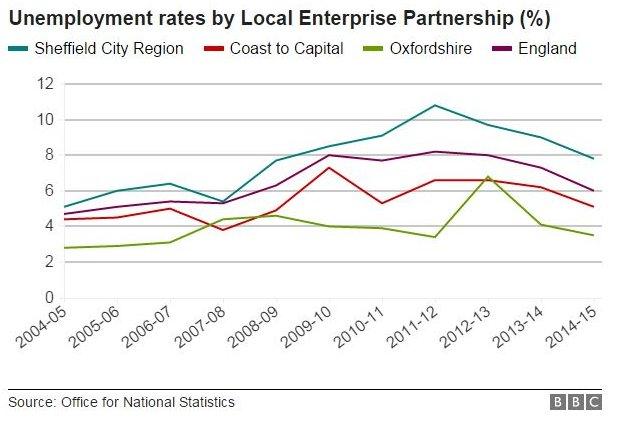
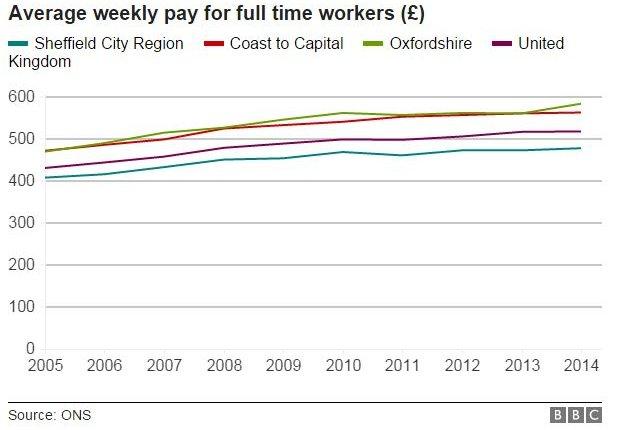
He said: "One of the more surprising elements was when you look at the economic output [gross value added (GVA)] of Sheffield City Region.
"This is an economy which contributes £30bn to the overall UK economy a year, but when you break that down into economic output per person Sheffield City Region comes out 38th out of 39 regions in England.
"The figure per person is around £17,000 a head - only Cornwall and the Isles of Scilly have a lower figure."
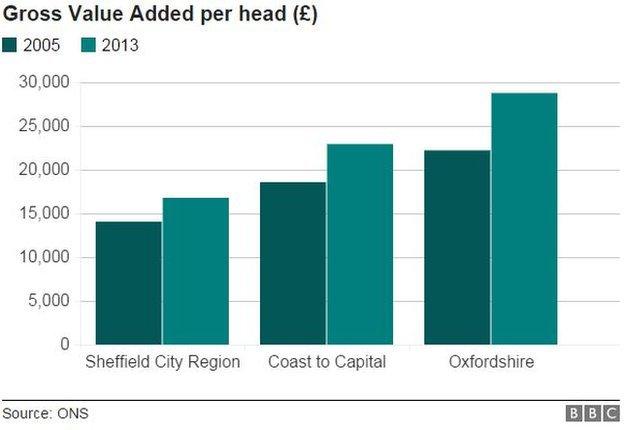
He said he one of the main reasons for the low GVA was the number of people in Sheffield employed in low wage and low skilled employment, such as retail, hotels and the restaurant sector.
"Those areas in the south have seen the percentage of people working in that sector decline in the last ten years, but in Sheffield City Region they have stayed flat," he said.
"Since 2012 when the economic recovery began to take place most new jobs in Sheffield City Region have been in that retail, hotels and restaurant sector, so what we need in Sheffield City Region are jobs in the higher value sectors such as finance, such as professional services and property services that the southern economies have a lot more of."
Sheffield City Region LEP
Top three employment sectors 2014/15
836,300
In employment
-
262,500 Public Services; Education; Health
-
162,300 Wholesale & Retail; Hotels; Restaurants
-
113,600 Manufacturing
Coast to Capital LEP
Top three employment sectors 2014/15
990,000
In employment
-
290,600 Public Services; Education; Health
-
192,000 Finance; Banking & Insurance; Property; Professional Services
-
160,400 Wholesale & Retail; Hotels; Restaurants
Oxfordshire LEP
Top three employment sectors 2014/15
349,100
In employment
-
115,500 Public Services; Education; Health
-
60,800 Finance; Banking & Insurance; Property; Professional Services
-
44,000 Wholesale & Retail; Hotels; Restaurants
As a region renowned for it's steel industry Mr Hunt said manufacturing was still "very important" to the Sheffield City Region, contributing about 14% of all jobs compared to 10% across England.
He said: "The good thing about manufacturing is that the pay rates are higher and it's a higher value sector, which means there's a good base we can build on."
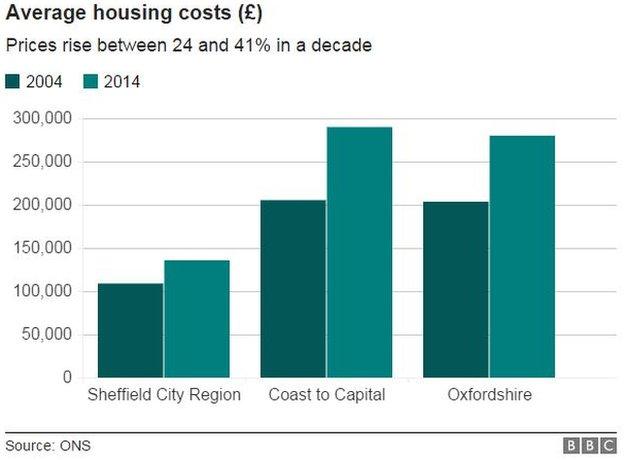
Reacting to the report, Sir Steve Houghton, chair of the Chair of the Sheffield City Region Combined Authority and Labour leader of Barnsley Council, said the key to addressing lay in improving the regions transport and infrastructure, skill levels and housing stock.
He said the region needed 6,000 new businesses and 70,000 jobs, including about 30,000 highly-skilled jobs, to catch up with its southern counterparts and called for Mr Osborne to "put his money where his mouth is".
However, he said he believed that the recent devolution deal was a step in the right direction.
"What the government has promised is £30m a year over 30 years. That's £900m and we've never been able to plan like that before".
'Direct control'
Northern Powerhouse Minister and Conservative MP James Wharton said: "We are serious about securing this country's economic future and are making huge progress driving forward the Northern Powerhouse.
"Just one year since we first set out our vision, the latest statistics show the total number of people in employment grew faster in the North and Midlands than in the South.
"Our deal with Sheffield, which includes £900m of government investment, will ensure local leaders have direct control to drive local economic growth and create thousands of new skilled jobs.
"There is huge potential in the North of England and we want that potential to be realised. This report underlines exactly why the Northern Powerhouse and devolution matter."
To hear more listen to BBC Radio Sheffield between 23 and 27 November.
- Published4 November 2015
- Published30 October 2015
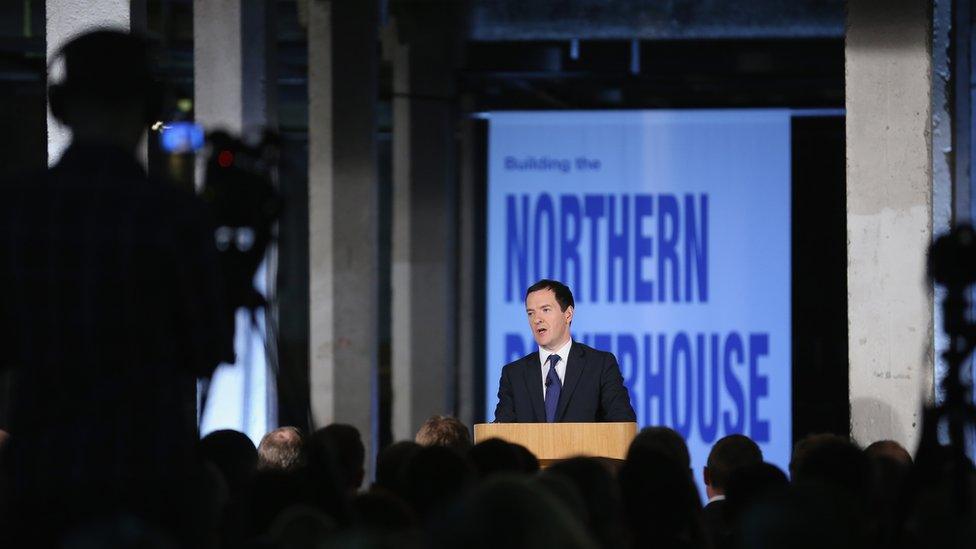
- Published2 October 2015

- Published14 May 2015
